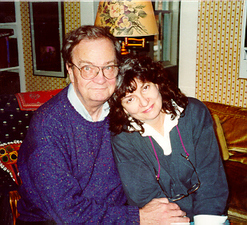Translations are an important part of the poetry world. Even translating the deceptively-simple haiku is difficult and worthy of argument. We use the phrase "lost in translation" more often in situations that don't have to do with going from one language to another.
You probably have tried one of the translation tools online, such as
Google Translate, and very likely found the results to be so literal that something was lost in the process. This is more likely when translating poetry and literature and language that is more figurative.
The poem "
On Translation" by Mónica de la Torre suggests that the translator's job is:
"Not to search for meaning, but to reedify a gesture, an intent.
As a translator, one grows attached to originals. Seldom are choices
so purposeful."
Translations can be far-reaching, such as those done for politicians in places like the United Nations.
Our prompt this month deals with translation
in poetry, but not necessarily
of poetry.


One poem in
Charles Baudelaire's collection Fleurs du mal (a title that easily translate to
Flowers of Evil) is "
Harmonie du soir." Just looking at the first stanza of that poem in several translations shows us the "problem" with translations.
Baudelaire wrote:
Voici venir les temps où vibrant sur sa tige
Chaque fleur s'évapore ainsi qu'un encensoir;
Les sons et les parfums tournent dans l'air du soir;
Valse mélancolique et langoureux vertige!
That stanza was translated by William Aggeler as:
The season is at hand when swaying on its stem
Every flower exhales perfume like a censer;
Sounds and perfumes turn in the evening air;
Melancholy waltz and languid vertigo!
But in the translation by Roy Campbell, the stanza becomes:
Now comes the eve, when on its stem vibrates
Each flower, evaporating like a censer;
When sounds and scents in the dark air grow denser;
Drowsed swoon through which a mournful waltz pulsates!
Cyril Scott translated that stanza in this way:
The hour approacheth, when, as their stems incline,
The flowers evaporate like an incense urn,
And sounds and scents in the vesper breezes turn;
A melancholy waltz — and a drowsiness divine.
And the version translated by Lewis Piaget Shanks looks like this:
the hours approach when vibrant in the breeze,
a censer swoons to every swaying flower;
blown tunes and scents in turn enchant the bower;
languorous waltz of swirling fancies these!
Which translation is the right one, or the best one, or the closest to what Baudelaire would have wanted to say in English?
I can't ask you this month to do translations of poems since many of us don't have multiple languages to use. Let us think about other instances of translation in our lives.
In "
Elegy in Translation" by Meg Day, she notes something we have all done - hearing a song lyric incorrectly:
"I saw Joni live and still thought
a gay pair of guys put up a parking lot."
Even after hearing the song sung live - like hearing a poet at a reading - she didn't hear the correct Joni Mitchell lyric ("They paved paradise and put up a parking lot.") though she may have known that was the actual line.
In the haiku-like "
Elvis in Translation" by Elaine Equi, she writes about one of the other kinds of translations we do in our lives.
"Sometimes the blue in
Blue Hawaii
gets lost. But Elvis’s eyes speak
pure Esperanto."
My own thought is that we are all translators, whether it be in our everyday lives or in the ways that we take experiences and translate them into poems for others to read and experience.
For this month's prompt, I ask you to focus on the act of translation in any form - actually translating from one language to another, interpreting and translating a conversation in our own language or a gesture or a facial reaction, a baby's cry, a pet's attitude, the meaning of clouds moving towards you - the possibilities are wide open and many. Is that translation accurate, successful, or is something lost or mistranslated?
I offer up my own take on translation as this month's model poem.
Translation
My grandparents would speak Slovak
with my father, the aunts and the uncles
at the Sunday dinners at their home in Newark
when they didn’t want us to know.
In those days, the priests spoke Latin.
That was the mystery of the faith.
The boys on the #42 bus spoke Spanish
as I rode to my afterschool job
and when they laughed, looking in my direction.
Too fast for my B+ Spanish III understanding
but enough that it hurt.
The waiter at the Chinese restaurant
changes my order into words
that I want to understand,
but will never know.
Translation.
This is the poet’s job,
and the job of the reader too.
We have been in training
all our lives.
by Kenneth Ronkowitz
Deadline for submissions is November 30, 2018
from Poets Online blog https://ift.tt/2PdzsxM




























